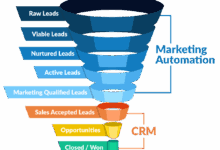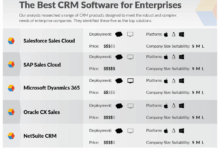Top Cloud-Based CRM Platforms
Top Cloud-Based CRM Platforms represent a significant shift in how businesses manage customer relationships. Moving beyond traditional on-premise systems, cloud-based CRMs offer scalability, accessibility, and cost-effectiveness that are transforming the modern business landscape. This exploration delves into the leading platforms, comparing their features, pricing, and suitability for various business needs, ultimately guiding you toward the optimal solution for your organization.
The transition to cloud-based solutions offers numerous advantages, including reduced infrastructure costs, enhanced collaboration, and improved data security through robust vendor-managed security protocols. This analysis will cover key aspects such as integration capabilities, customization options, and the crucial element of data security, ensuring a comprehensive understanding of the available choices.
Introduction to Cloud-Based CRM Platforms
Cloud-based CRM platforms represent a significant shift in how businesses manage customer relationships. They offer a flexible and scalable alternative to traditional on-premise systems, leveraging the power of the internet to store and access customer data. This approach eliminates the need for extensive internal IT infrastructure and allows for greater accessibility and collaboration.
Cloud-based CRM systems offer several key advantages over their on-premise counterparts. The most notable benefits include reduced upfront costs, increased scalability to accommodate business growth, enhanced accessibility from anywhere with an internet connection, automatic software updates and maintenance handled by the provider, and improved collaboration among team members. These factors contribute to a more efficient and cost-effective way to manage customer interactions.
Types of Cloud-Based CRM Platforms
Cloud-based CRM platforms are typically categorized into three main deployment models: Software as a Service (SaaS), Platform as a Service (PaaS), and Infrastructure as a Service (IaaS). Understanding these models helps businesses choose the option best suited to their specific needs and technical capabilities. SaaS offers a complete, ready-to-use CRM solution, while PaaS provides a platform for building and customizing CRM applications. IaaS offers the most control, providing the underlying infrastructure for building and managing a CRM system.
Comparison of Cloud CRM Deployment Models
The following table compares the key features of the three main cloud CRM deployment models:
| Deployment Model | Scalability | Cost | Security | Control |
|---|---|---|---|---|
| SaaS (Software as a Service) | Highly scalable; easily adjust resources based on need. | Typically subscription-based, predictable costs. | Provider manages security, but data security remains a shared responsibility. | Limited control over infrastructure and customization. |
| PaaS (Platform as a Service) | Scalable, but requires more technical expertise to manage. | Cost varies depending on usage and resources consumed. | Shared responsibility model; provider manages infrastructure, but user manages application security. | More control over application development and customization. |
| IaaS (Infrastructure as a Service) | Highly scalable; users manage resources and scaling. | Pay-as-you-go model; costs can fluctuate based on usage. | Significant user responsibility for security at all levels. | Maximum control over infrastructure and application. |
Top Platforms
Choosing the right cloud-based CRM can significantly impact a business’s efficiency and growth. This section provides an overview of five leading platforms, comparing their features and pricing models to help you make an informed decision. Understanding these differences is crucial for aligning your CRM selection with your specific business needs and budget.
Leading Cloud-Based CRM Platforms: An Overview
Five leading cloud-based CRM platforms are Salesforce Sales Cloud, Microsoft Dynamics 365, HubSpot CRM, Zoho CRM, and SAP Sales Cloud. Each platform offers a robust suite of features, but their strengths and target audiences vary considerably.
Feature Comparison and Unique Selling Points
The core features of these platforms are broadly similar, encompassing contact management, lead tracking, sales pipeline management, reporting and analytics, and customer service capabilities. However, each platform boasts unique selling points that differentiate it from the competition. Salesforce, for example, is renowned for its extensive customization options and robust integrations, making it suitable for large enterprises with complex needs. Microsoft Dynamics 365 integrates seamlessly with other Microsoft products, offering a familiar interface for Microsoft users. HubSpot CRM emphasizes inbound marketing features, making it a strong choice for businesses focused on attracting and nurturing leads. Zoho CRM is known for its affordability and comprehensive feature set, catering to a wider range of businesses. SAP Sales Cloud is a powerful solution ideal for large organizations needing enterprise-grade functionality and seamless integration with their existing SAP ecosystem.
Pricing Models and Target Users
Pricing models vary across these platforms, generally employing tiered pricing structures based on the number of users and features included. Salesforce Sales Cloud, for instance, typically utilizes a per-user, per-month subscription model with various editions offering different functionalities. Microsoft Dynamics 365 also uses a similar model, but its pricing can be more complex due to the wide range of modules available. HubSpot CRM offers a generous free plan alongside paid options, making it accessible to startups and smaller businesses. Zoho CRM offers a flexible pricing structure with various plans catering to different business sizes and needs. SAP Sales Cloud, due to its complexity and enterprise focus, often involves custom pricing quotes based on specific requirements.
Platform Comparison Table
| Platform Name | Key Features | Pricing Model | Target User |
|---|---|---|---|
| Salesforce Sales Cloud | Extensive customization, robust integrations, advanced analytics, strong automation capabilities | Tiered, per-user, per-month subscription | Large enterprises, complex sales processes |
| Microsoft Dynamics 365 | Seamless Microsoft ecosystem integration, robust reporting, strong customer service capabilities | Tiered, per-user, per-month subscription, complex pricing | Businesses already invested in the Microsoft ecosystem |
| HubSpot CRM | Strong inbound marketing features, lead nurturing tools, contact management, sales pipeline management | Free plan, tiered paid plans | Startups, small to medium-sized businesses |
| Zoho CRM | Comprehensive feature set, affordable pricing, good customization options | Tiered, per-user, per-month subscription, various plan options | Small to medium-sized businesses, budget-conscious organizations |
| SAP Sales Cloud | Enterprise-grade functionality, seamless integration with SAP ecosystem, robust analytics | Custom pricing quotes | Large enterprises, organizations heavily invested in SAP |
Integration Capabilities and Customization
Choosing the right cloud-based CRM often hinges on its ability to seamlessly integrate with existing business tools and adapt to specific organizational needs. This section explores the integration and customization capabilities offered by leading CRM platforms, highlighting their strengths and potential applications. Understanding these features is crucial for maximizing the effectiveness of your CRM system and achieving a streamlined workflow.
The ability to integrate a CRM with other software is paramount for efficient data management and improved business processes. Top CRM platforms typically offer robust APIs and pre-built integrations with popular email marketing services, accounting software, and other business applications. This interoperability allows for automated data synchronization, reducing manual data entry and minimizing errors. Customization options further extend the CRM’s functionality, allowing businesses to tailor the platform to their unique requirements.
Integration with Other Business Tools
Leading CRM platforms like Salesforce, HubSpot, and Zoho CRM offer extensive integration capabilities. Salesforce, for example, boasts an AppExchange marketplace with thousands of third-party apps, enabling connections with a vast array of tools. HubSpot integrates tightly with its own suite of marketing and sales tools, offering a cohesive ecosystem. Zoho CRM also provides a robust integration platform, supporting connections with various applications through APIs and pre-built connectors. These integrations allow for automated data flow between the CRM and other systems, such as email marketing platforms for targeted campaigns, accounting software for streamlined financial reporting, and e-commerce platforms for order management.
Customization Options
Customization is another key factor in selecting a CRM. Top platforms allow for extensive customization to fit specific business needs. This typically includes workflow automation, enabling the creation of automated processes for tasks such as lead assignment, follow-up emails, and reporting. Custom fields allow businesses to add specific data points relevant to their operations, beyond the standard CRM fields. For instance, a real estate company might add custom fields for property type, square footage, and listing price, while a tech company could add fields for software version, customer segment, and support ticket number. These customizations significantly enhance data management and reporting capabilities.
Hypothetical Integration Scenario: CRM and Email Marketing
Imagine a clothing retailer using Zoho CRM and Mailchimp. When a new lead signs up on the retailer’s website, their information is automatically captured and added to Zoho CRM. Using Zoho’s integration with Mailchimp, this lead is simultaneously added to a specific Mailchimp list. The retailer then uses Mailchimp to create targeted email campaigns based on the lead’s information, such as product recommendations based on browsing history or promotional offers based on location. As the lead interacts with the email campaign (opens, clicks), this data is automatically synced back to Zoho CRM, enriching the lead’s profile and providing valuable insights for sales representatives. This seamless integration streamlines marketing efforts and provides a unified view of customer interactions.
Examples of Custom Fields
To illustrate the power of custom fields, consider these examples:
| Industry | CRM | Example Custom Fields |
|---|---|---|
| Real Estate | Salesforce | Property Address, Square Footage, Listing Price, Property Type, Agent Assigned |
| Technology | HubSpot | Software Version, Customer Segment, Support Ticket Number, Contract Renewal Date, Primary Contact Person |
| Healthcare | Zoho CRM | Patient ID, Insurance Provider, Doctor Assigned, Treatment Date, Medication List |
Security and Data Management
Choosing a cloud-based CRM involves careful consideration of data security and management practices. The security of your customer data is paramount, and leading platforms employ robust measures to protect it. Understanding these measures and the data management processes is crucial for making an informed decision.
The top cloud-based CRM platforms prioritize data security through a multi-layered approach. This typically includes robust encryption both in transit and at rest, employing technologies like TLS/SSL and AES-256 encryption. Access controls, based on role-based permissions, limit access to sensitive data only to authorized personnel. Regular security audits and penetration testing identify and address vulnerabilities proactively. Furthermore, these platforms invest heavily in infrastructure security, employing firewalls, intrusion detection systems, and other preventative measures to protect against cyber threats.
Data Backup and Recovery Procedures
Data backup and recovery are critical components of any robust data management strategy. Leading CRM platforms offer automated, regular backups to ensure data redundancy and business continuity. These backups are often stored in geographically separate locations to mitigate the risk of data loss due to regional disasters. Recovery procedures are clearly defined and regularly tested to ensure a quick and efficient restoration of data in case of failure or cyberattack. Many platforms offer options for point-in-time recovery, allowing users to restore data to a specific point in time before an incident occurred. This level of granularity is essential for minimizing data loss and ensuring business operations can resume swiftly.
Compliance Certifications
Compliance with industry regulations is a crucial aspect of data security for CRM platforms. Many leading platforms hold certifications such as ISO 27001 (information security management), SOC 2 (Service Organization Control 2), GDPR (General Data Protection Regulation), and HIPAA (Health Insurance Portability and Accountability Act). These certifications demonstrate the platform’s commitment to meeting stringent security and privacy standards. The specific certifications held vary depending on the platform and its target market. For example, a platform targeting healthcare providers would likely hold HIPAA compliance, while a platform serving a global clientele would need GDPR compliance. The presence of these certifications provides assurance to customers that their data is handled responsibly and in accordance with relevant regulations.
Best Practices for Data Security within a Cloud-Based CRM
Implementing best practices within your organization is crucial for maximizing the security provided by the CRM platform. The following points highlight key strategies:
- Strong Password Policies: Enforce strong, unique passwords for all user accounts and encourage regular password changes.
- Multi-Factor Authentication (MFA): Implement MFA to add an extra layer of security, requiring users to provide multiple forms of authentication before accessing the system.
- Regular Security Training: Conduct regular security awareness training for all employees to educate them about phishing scams, social engineering, and other potential threats.
- Access Control Management: Regularly review and update user roles and permissions to ensure only authorized personnel have access to sensitive data. The principle of least privilege should be applied.
- Data Encryption: Encrypt sensitive data both at rest and in transit, using industry-standard encryption algorithms.
- Regular Data Backups: Ensure regular, automated backups are performed and stored securely in a geographically separate location.
- Incident Response Plan: Develop and regularly test an incident response plan to handle security breaches or data loss effectively.
User Experience and Support
A cloud-based CRM’s success hinges not only on its features but also on how easily users can access and utilize them. A well-designed user interface (UI) and positive user experience (UX) are crucial for driving adoption and maximizing the platform’s value. Equally important is the level of support offered by the vendor to assist users in navigating the platform and resolving any issues.
The intuitive navigation and accessibility of features directly impact user adoption rates. A complex or poorly designed interface can lead to frustration, decreased productivity, and ultimately, abandonment of the system. Conversely, a user-friendly interface promotes seamless workflow integration, resulting in increased user engagement and a higher return on investment. The availability of robust customer support further mitigates potential issues and ensures a smooth user journey.
User Interface and User Experience Evaluation
Each platform presents a unique user experience. Salesforce, for example, is known for its comprehensive feature set, but this can sometimes lead to a steeper learning curve for new users. Zoho CRM, on the other hand, often receives praise for its intuitive interface and ease of use, making it a popular choice for smaller businesses. Microsoft Dynamics 365 boasts a powerful and customizable interface, although its complexity can require more extensive training. HubSpot CRM prioritizes ease of use and marketing integration, offering a streamlined experience for sales and marketing teams. Lastly, Pipedrive focuses on sales pipeline management, providing a clean and efficient interface specifically designed for this purpose. These variations highlight the importance of choosing a CRM platform that aligns with the specific needs and technical proficiency of the user base.
Customer Support Options
Customer support is a critical component of any CRM platform. The effectiveness of support can significantly influence user satisfaction and overall platform adoption. Vendors typically offer a range of support channels, including phone support, email, online chat, and comprehensive knowledge bases or help centers. Response times and the quality of support provided can vary significantly between vendors.
Comparison of Customer Support Offerings
The following table compares the customer support offerings of five leading cloud-based CRM platforms. Note that specific response times and available resources can fluctuate based on factors such as support plan and current demand.
| Platform | Support Channels | Response Time (Typical) | Support Resources |
|---|---|---|---|
| Salesforce | Phone, Email, Chat, Community Forums, Knowledge Base | Varies depending on plan; generally within 24-48 hours for email | Extensive documentation, training videos, community forums, developer resources |
| Zoho CRM | Email, Chat, Phone (for paid plans), Knowledge Base, Help Center | Varies depending on plan and channel; generally quick response for chat | Comprehensive documentation, video tutorials, FAQs, community forum |
| Microsoft Dynamics 365 | Phone, Email, Chat, Online Support, Partner Network | Varies depending on plan and support level; generally faster response for paid support plans | Extensive documentation, training materials, partner resources, online community |
| HubSpot CRM | Email, Chat, Knowledge Base, Community Forums, Academy | Generally quick response for chat; email response time varies | Extensive documentation, video tutorials, blog posts, free online courses |
| Pipedrive | Email, Chat, Phone (for paid plans), Knowledge Base, Help Center | Varies depending on plan and channel; generally quick response for chat | Comprehensive documentation, video tutorials, FAQs |
Scalability and Future-Proofing
Choosing a CRM platform involves considering not only its current capabilities but also its ability to grow and adapt with your business. A future-proof solution should seamlessly accommodate increasing data volumes, expanding user bases, and evolving business processes. The scalability and adaptability of the platform are critical factors influencing long-term cost-effectiveness and operational efficiency.
The leading cloud-based CRM platforms generally offer robust scalability options, leveraging the inherent flexibility of cloud infrastructure. However, the specific mechanisms and capabilities vary across providers. Understanding these differences is crucial for aligning your CRM investment with your business’s growth trajectory and anticipated technological advancements.
Scalability Mechanisms
Different platforms utilize various strategies to ensure scalability. Some rely on dynamic resource allocation within the cloud environment, automatically adjusting computing power and storage based on demand. Others offer tiered pricing models, allowing businesses to upgrade their subscription to access higher processing capacities and data storage limits as needed. Salesforce, for example, utilizes a multi-tenant architecture, sharing resources efficiently across multiple clients, while still providing each client with isolated data and performance guarantees. This allows Salesforce to scale efficiently to support a vast number of users and data volumes. In contrast, platforms like Microsoft Dynamics 365 leverage a hybrid approach, allowing businesses to opt for cloud-based or on-premise deployments or a combination of both, providing flexibility in scaling according to their specific needs and infrastructure.
Adaptability to Evolving Business Needs
Adaptability is crucial in a dynamic business environment. The best platforms provide flexibility to integrate new functionalities, accommodate changes in workflows, and incorporate emerging technologies. This might involve integrating with new marketing automation tools, incorporating AI-powered features for sales forecasting, or adopting new communication channels. For example, many platforms now readily integrate with various messaging apps like WhatsApp, enabling businesses to streamline customer communication and improve response times. This integration demonstrates adaptability to the changing communication preferences of customers. Furthermore, platforms often support custom application development through APIs, allowing businesses to tailor the CRM to their unique needs.
Platform Roadmaps and Future Development
Leading CRM providers actively invest in research and development, regularly updating their platforms with new features and enhancements. These roadmaps often reflect industry trends and emerging technologies. For instance, many platforms are integrating advanced analytics capabilities, providing businesses with more sophisticated insights into customer behavior and sales performance. Salesforce’s Einstein AI is a prime example, offering predictive analytics and intelligent automation features. Microsoft Dynamics 365 also actively incorporates AI capabilities, including predictive lead scoring and intelligent chatbots. Regularly reviewing these roadmaps provides valuable insight into the platform’s long-term vision and its potential to meet future business needs. These roadmaps often outline plans for enhancing user experience, expanding integration capabilities, and improving security features.
Addressing Future Technological Advancements
Cloud-based CRM platforms are designed to leverage the latest technological advancements. This includes the adoption of AI and machine learning for improved automation and predictive capabilities, as previously mentioned. Furthermore, many platforms are incorporating blockchain technology to enhance data security and transparency. The increasing use of IoT (Internet of Things) is also being addressed, with platforms developing capabilities to integrate data from connected devices to provide a more comprehensive view of customer interactions. For example, a CRM could integrate data from smart home devices to personalize marketing campaigns or provide proactive customer support based on usage patterns. The ability to seamlessly integrate with these emerging technologies ensures that the CRM remains a relevant and valuable asset for businesses in the long term.
Final Thoughts
Choosing the right cloud-based CRM is a pivotal decision for any business aiming to optimize customer interactions and drive growth. By carefully considering factors such as scalability, integration capabilities, security measures, and user experience, organizations can select a platform that aligns perfectly with their specific requirements and future aspirations. This evaluation provides a solid foundation for making an informed choice, ensuring a seamless transition to a more efficient and effective customer relationship management strategy.



